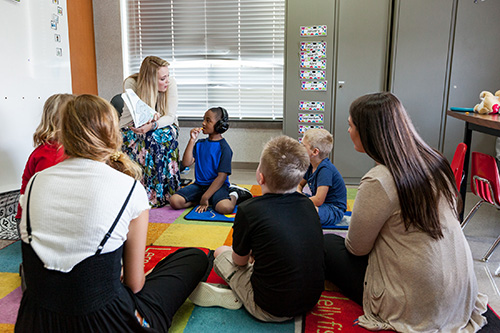WKU News
Project PREP students working together at Camp COLLAB
- WKU News
- Thursday, July 15th, 2021

In one room at the Suzanne Vitale Clinical Education Complex, children who attend the Kelly Autism Program are learning about numbers in a math lesson. In another room, a group is listening to a story about ice cream and learning about sharing and manners.
The group leaders for Camp COLLAB (Communicate with Others, Listen, Learn and Activate Brainpower) are nine WKU graduate students in the special education and speech language pathology programs. (More: View from the Hill)
“Camp COLLAB is a dual partnership between teachers and speech language pathologists where we work on both academic and communication goals with the collection of students we have here,” said Veronica Hess of Hardinsburg, a second-year graduate student in speech language pathology.
Hess is a member of the first cohort of Project PREP (Preparing Rural Educators and Professionals for Students with High-Intensity Needs), a five-year federally funded collaboration between the College of Education and Behavioral Sciences and the College of Health and Human Services.
In January 2020, the U.S. Department of Education’s Office of Special Education awarded WKU a $1.1 million grant to address the national, state, and regional shortage of personnel certified to serve K-12 students with high-intensity needs. Project PREP combines graduate coursework and field experiences to prepare special education teachers and speech language pathologists to serve students with moderate and severe disabilities.
During the Camp COLLAB sessions, the groups work on social, adaptive, communication and academic skills with children who have high-intensity needs.
Project PREP leaders Dr. Christina Noel and Dr. Janice Carter Smith are pleased with the inaugural group’s progress.
“Communication is such a need for individuals with low-incidence disabilities, so we really need our teachers and our speech language pathologists to be very good at using communication devices and prompting out language,” said Dr. Noel, Associate Professor in the Department of Special Education. “We sometimes see a lot of behavior problems in schools associated with not being able to communicate. That’s why it makes sense for CEBS and CHHS to come together. We each have our own skill sets.”
Dr. Smith, a professor in the Department Communication Sciences and Disorders, is a former speech therapist for Butler County Schools. “Through my time there as a speech therapist, I learned how important the relationship is between the special educator and the speech therapist for the child,” she said. “This grant is like ‘hashtag goals’ for me because before these students get into the field as speech language pathologists we get to show them how that collaboration works and how powerful it can be.”
Katey Carman of Hardinsburg, a kindergarten teacher at Ben Johnson Elementary School, has enjoyed collaborating with speech therapists.
“This is definitely boot camp,” she said. “I have learned so much already. We have students who have complex communication needs, so that’s something I’m not necessarily used to. They have AAC (augmentative and alternative communication) devices that I’m learning about. I’m learning how to use them. They’re learning how to use them. As a kindergarten teacher I’m used to children responding back to me. So, learning how to take that time and let them use their device to respond to me is a huge thing I’ve learned so far.”
Carman also noted that a former professor reminded students that all teachers are special education teachers. “That’s always struck a chord with me because in the classroom, we have all needs and all ranges of abilities. We have gifted children. We have children who struggle with emotional needs. I can use what I learn here and take that back to my classroom and apply that. I want to create a more inclusive environment in our classrooms.”
Hess, who will complete the SLP program in 2022, said Camp COLLAB has helped prepare her to work with young children as an early interventionist. “It’s given me a lot of understanding of the academic aspects because I’ve spent the past six years learning about speech language pathology, but not really how it connected to academics,” she said. “So, I’m getting to work with the teachers. Even in my speech sessions, we’re getting to teach them about language techniques and sharing in our different modalities.”
Participants in Camp COLLAB are four Master of Arts in Education (MAE) in Moderate Severe Disabilities (MSD) students -- Katey Carman of Hardinsburg, Emma Taylor of Glasgow, Charley Jo Vaughn of Franklin and Krystal Hill of Owensboro; and five Master of Arts in Speech Language Pathology (SLP) -- Shelby Jo Cecil of Owensboro, Veronica Hess of Hardinsburg, Meghan Rice of Manchester, Madison Evetts of Lafayette, Tennessee, and Baylee Lackey of Clarksville, Tennessee.
Dr. Noel credits Dr. Richard Dressler, the former head of the Department of Communication Sciences and Disorders who passed away in December 2020, with being the driving force in WKU getting the federal grant to train graduate students in the MSD and SLP programs.
The first cohort has laid the foundation for the next Project PREP participants as students in two academic colleges collaborate to learn new skills that will benefit children with complex communication needs.
“At our school, we haven’t always worked closely with the speech therapist,” Carman said. “This is teaching us about their role and our role. We can work together to hopefully help those children adapt in a regular education classroom. We’re seeing what they do and they’re seeing what we do. We’re getting a taste of both worlds.”
Contact: Dr. Christina Noel, christina.noel@wku.edu or Dr. Janice Carter Smith, janice.smith@wku.edu
Some of the links on this page may require additional software to view.

